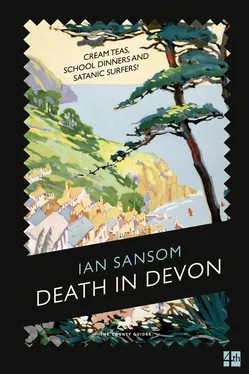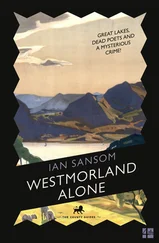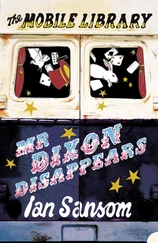‘Apparently not,’ I said.
‘Did you see the sign, Father?’
‘Sign?’
‘For the school?’
‘No idea,’ said Morley. ‘But I think we might be able to climb down here, actually. Onto a little beach.’ He was standing perilously close to some loose scree.
‘Father!’ called Miriam. ‘For goodness sake, not tonight!’
‘A night-time descent might be rather fun,’ said Morley, staring down, illuminated by the headlamps of the car and framed by the bright-lit moon, making him appear rather like his own ghost, or a velvety shadow puppet.
‘We’re going back to find the school, Father.’
‘But—’
He had edged close enough now for us both to be concerned about his safety.
‘Should I?’ I asked Miriam.
‘Would you mind awfully?’ she replied.
And so I jumped out of the car and edged close enough to Morley to make a grab at his clothes if he were to lose his footing.
‘What do you think, Sefton?’
‘It is certainly a steep cliff-face, Mr Morley. And we’re all rather lucky not to be heading over the edge.’
‘Five-hundred-foot drop, would you say?’
‘Something like it,’ I said.
‘V. diff., do you think?’
‘V. diff.?’
‘Climbing-wise.’
‘Yes,’ I said, not entirely sure what he meant.
‘Straight down to a nice little hidden beach.’
‘Indeed. Quite a drop.’
‘Into the ocean.’
‘Indeed.’
‘The abyss – tehom , in the Hebrew, isn’t it? “Draw me out of the mire, that I may not stick fast: deliver me from them that hate me, and out of the deep waters. Let not the tempest of water drown me, nor the deep swallow me up: and let not the pit shut her mouth upon me.” What is that? Psalms … 68? 69?’
‘I don’t remember exactly.’
‘Ever done any mountaineering of any kind, Sefton?’
‘I can’t say I have, Mr Morley, no.’
‘Well, we’ll have to put that right. I was lucky enough to have climbed with Mallory and Sandy Irvine. Long time ago. Do you know Lisle Strutt?’
‘No, I’m afraid not.’
‘Glad to hear it. President of the Alpine Club. I resigned in protest. Not a fan.’
‘Father, come on!’ said Miriam. ‘Enough shilly-shallying. It’s late.’
‘Next trip, we’ll bring along some rock boots and rope and see where it takes us, shall we?’
‘That sounds like an excellent idea,’ I said. ‘I look forward to it.’
‘Not tonight though, chaps, eh?’ cried Miriam, who had lit a cigarette and who seemed to have instantly recovered from our near-death experience and was enjoying the cool breeze from the sea. She, like her father, rather enjoyed risk-taking, near-misses and every other kind of calamity. Neither of them, of course, had ever been to war.
‘Thing to remember, Sefton,’ said Morley, as we made our way back to the car, ‘is that the top of the ascent is the most dangerous part of any climb. The summit, you see. Gets the old heart racing.’
‘Is your heart racing, Sefton?’ said Miriam, as we clambered back into the car.
I was in fact feeling my stomach grumbling – we hadn’t had anything to eat since our filthy Nell Gwynn buns.
‘You know, we could camp out here for the night,’ said Morley. ‘Do you remember we used to do that when you were young, Miriam? In the old Standard? It had the detachable front seats, and your mother would—’
‘Not tonight, Father,’ cried Miriam.
‘“Only the road and the dawn,”’ said Morley, ‘“the sun, the wind and the rain, / And the watch fire under stars, and sleep and the road again.”’
‘Not tonight, thank you, Father!’
‘Very well,’ said Morley.
‘Onwards!’ said Miriam.
‘Or backwards,’ said Morley, ‘to be accurate.’
‘Thank you, Father.’
Eventually managing to reverse back up the lane in the Lagonda – after much pushing and the grinding of gears – we picked up another route and soon found ourselves stopping in a courtyard outside an enormous building that by all appearances – mullioned windows, finialled gables, coats of arms and what-not – had to be the main Rousdon manor house. We had arrived at All Souls.
CHAPTER 5
A SODALITY OF PEDAGOGUES
AT THE SOUND OF OUR APPROACH the vast door of the manor house was swung open by a worried-looking young woman, apparently a nurse, who was done out in a most striking outfit, consisting of a blood-red dress with a white apron over it, and a little Sister Dora cap perched jauntily on her head, which gave her the appearance of someone having just rushed panicking from performing some particularly grisly surgery. From behind this rather ghoulish creature first came there a voice, and then a man, shuffling into view.
‘Do I hear John Bull’s roar?’ cried the voice. ‘The People’s Professor?’
‘You have been in Afghanistan, I perceive,’ Morley said to the figure who now stood in the doorway. Their exchange of words caused much mutual amusement – it was some kind of private greeting, I understood. There was then a prolonged and vigorous shaking of hands – the two men seemed to operate on the same frequency and gave off exactly the same vibration of relentlessly hearty vigour – and Morley then introduced us.
‘This is Dr Standish,’ he said. ‘Headmaster of All Souls.’
‘Well, well, well,’ said Dr Standish. ‘What do we have here?’
What we had here was a man who might almost have been Morley’s double, though perhaps a little more careworn, his face perhaps rather coarser-featured, his cheeks perhaps a little redder and rounder, his moustache rather more drooping, and his eyes small and hard and bitter, like a blackbird’s.
‘This is my assistant,’ said Morley, ‘Mr Stephen Sefton.’
‘Your Boswell, eh, Swanton?’ said Dr Standish, in a rather sniggering fashion, I thought.
‘I don’t know about that,’ I said. We shook hands: he gave off a slight whiff of lavender, as though having only recently bathed.
‘I have always been of the opinion,’ said Morley, ‘that the Great Cham was in fact a fictional character invented by the scheming Scotsman as a way of making a reputation for himself.’
‘Ha ha! Very good!’ said Dr Standish, smiling and showing a set of gleaming teeth. ‘Though I’m sure such treasonous thoughts are far from the mind of your young assistant.’
‘Indeed,’ I agreed. Nothing could have been further from my mind.
‘And this is my daughter,’ said Morley.
‘Charmed,’ said Miriam, offering her hand, and simpering rather.
‘Well, well,’ said Dr Standish. ‘You have grown up since last we met.’
‘Indeed, we are now full-grown,’ said Miriam, hoisting herself up to her not inconsiderable height, and gazing at him, mesmerisingly, in her fashion, over her cheekbones.

Puer Aeternus, The Eternal Boy
‘You haven’t aged, though, Headmaster,’ said Morley.
‘Well, teaching keeps one young, I suppose.’
‘ Puer Aeternus ,’ said Morley. ‘The Eternal Boy.’
‘Indeed,’ said Dr Standish. ‘No need to stand on ceremony though, old friend. Come in, come in, come in!’
Given Morley’s well-known quirks and attributes – his extraordinary working habits, his odd detachment from others, his fixation on objects, his obsession with classification, and his complete and utter inability to understand or to be able to empathise with others – one might have suspected that he would have found close relationships almost impossible to maintain. In fact, as I was to discover during the course of our time together, he was a man who attracted and enjoyed the company of all sorts of individuals, of both sexes, of all ages, all classes and all kinds. Of course above all he attracted fans, with whom and about whom he was always polite and courteous. Much of my time was spent protecting him from these fans, and from all sorts of other less well-meaning hangers-on and acolytes. (He was most often beset and troubled by those whom one might call Morley-mimickers: one thinks most readily perhaps of Frederick Bryson and John Fry, Morley-mimickers of brief renown. Such individuals often started out as fans, became acolytes, and then attempted to actually become Morley – ‘stealing our bread from the table’, as Morley often complained – trying to forge careers as hacks and popular writers, though none of them could match Morley’s own ferocious output. About such types Morley could be surprisingly and shockingly discourteous. Bryson, for example, I recall him once describing as a ‘sunburned nut’: he famously kept a house on the French Riviera. And Fry he often referred to simply as ‘the Pygmy’: he was a man famously short in stature.) But Morley also had real actual friends, and Dr Standish was one of them: he had contributed to a number of volumes edited by Morley for the edification of the young, including Manners Maketh the Man: A Guide for Parents and Teachers (1932), and A Boy’s First Fingering: Easy Piano Pieces for Small Hands (1934).
Читать дальше













